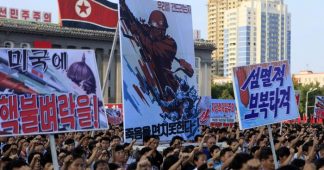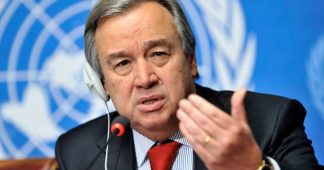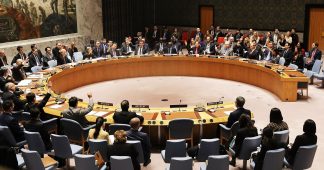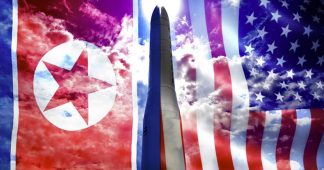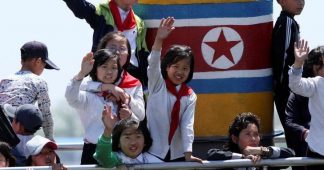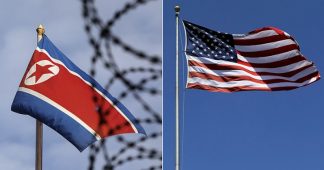Day of Infamy for the UN Security Council: Triggering a Devastating Humanitarian Crisis in North Korea
Resolution 2397, December 22, 2017: Security Council Inflicts Gestapo-Style Sanctions on DPRK, Despite Warnings They Will Annihilate the People of North Korea
By Carla Stea
Ignoring the avalanche of evidence that prior sanctions on the DPRK are causing a devastating humanitarian crisis for the people of North Korea, especially the most vulnerable, on December 22, despite warnings of the catastrophic consequences to the people, the UN Security Council passed a new set of sanctions so draconian and inhumane that they must be compared to Hitler’s Nuremberg laws.
In quintessentially bad faith, many of these Security Council diplomats who voted “yes” professed ignorance of the human suffering their prior sanctions were inflicting, or are wantonly indifferent to the human agony their votes for these new sanctions make inevitable.
In view of the collapse of the DPRK’s socialist economic system these sanctions are intended to provoke, the ultimate question remains why China and Russia failed to veto these sanctions, while they have the power to prevent this catastrophe. What “arrangements” were made? Has the U.S. juggernaut succeeded in inducing the short-sighted submission of Russia and China, who must certainly anticipate the horrific results of a collapse of the DPRK, which will lead to the complete destabilization of the Eurasian continent, a permanent American military presence, and probably nuclear war. Surely Russia must remember that Gorbachev was assured by U.S. Secretary of State James Baker, that, in return for the Soviet Union’s agreement to the reunification of Germany,
“NATO will not expand one inch east of Berlin.”
Today Russia is surrounded by NATO bases. Was Gorbachev gullible or treacherous? Russians frequently suspect the latter.
All five permanent members of the Security Council are themselves are in gross violation of Article 6 of the Nuclear Non-Proliferation Treaty, which requires their divesting their military arsenals of nuclear weapons; they are, instead, investing trillions of dollars in upgrading “nukes.” Article 6 of the NPT requires their negotiating, in good faith, a treaty to abolish nuclear weapons,; this United Nations treaty was adopted this year, ignored by Russia and China, and opposed by the US, UK and France in a virulent campaign. The US is also violating article 1 of the NPT, placing nuclear weapons in 5 NATO countries: these 5 countries, including Italy, the Netherlands, Turkey, and Germany are in violation of Article 2 of the NPT. In violation of the NPT, themselves, the Permanent 5 members of the Security Council have absolutely no right to condemn the DPRK, which is not even a party to the NPT.
United Nations Security Council resolution 2397 dooms the UN to a legacy of destruction of stable, progressive independent nations including Iraq, Libya, and now the DPRK.
Prior to the adoption of resolution, 2397, the UN Human Rights Commissioner revealed that the tough sanctions already imposed on the DPRK are obstructing delivery of desperately needed humanitarian aid. As a result, 70% of the population, 18 million North Koreans suffer from acute food shortages. Sanctions obstructing international bank transfers are blocking UN ground operations, preventing delivery of food, medical equipment and other humanitarian aid.
According to AFP:
“’Aid groups are facing hurdles to clear customs for goods destined for North Korea, to ensure procurement and transport of aid supplies, as well as rising food prices that have shot up 160% since April,’ said UN Assistant Secretary-General Miroslav Jenca.”
On December 9, NBC news reported:
“The Trump administration’s primary North Korea strategy would do little to curb the country’s nuclear program, and could trigger a famine, according to experts. The White House is urging China to turn off oil supplies to the 25 million Koreans…many analysts say such a move would have minimal impact on North Korea’s nuclear and missile programs, and would instead hit the country’s agricultural sector, potentially leading to mass starvation.”
Dr. David Von Hippel, a senior adviser at the Nautilus Institute for Security and Sustainability warned the results of an oil embargo could have a catastrophic impact on a humanitarian level.
“An oil cutoff would drastically reduce the amount of domestically grown food available to the civilian population….What arable land there is the DPRK farms intensively. They rely on tractors, irrigation pumps, refrigerators and transportation trucks to harvest and distribute food before it rots….even the current level of sanctions imposed in September (Resolution 2375) will impoverish North Korea’s breadbasket.”
On October 25 UN Special Rapporteur on Human Rights in the DPRK, Tomas Quintana stated that he was
“alarmed by reports that sanctions may have prevented cancer patients from access to chemotherapy…the shipment of wheelchairs and essential equipment for persons with disabilities is now constrained…humanitarian actors are facing difficulties to source much-needed supplies and carry out international financial transactions.”
Following his return from Pyongyang, UN Under-Secretary-General for Political Affairs, Jeffrey Feltman stated:
“What I was concerned about was the reduction in programs for the DPRK. The program is only 30 percent funded. It’s having a large impact on how the UN can deliver on its humanitarian programs. I was concerned about the overall lack of funding…which affects the UN’s ability to deliver life-saving equipment on the ground.”
This humanitarian disaster is neither accidental nor coincidental. All this information was publicly available to all 15 members of the Security Council prior to December 22, when they inflicted even more deadly sanctions on the people of North Korea. The Security Council is an accessory to these crimes. Though they boast, irresponsibly, that the sanctions contain “humanitarian exemption,” how do they explain the alarming failure to implement these “humanitarian exemptions,” and the fact that the tragic victims of these criminal and fatal sanctions are the majority of the people of North Korea?
The damning answer is revealed in the investigation of the failure of “humanitarian aid” in the case of sanctions against Iraq, which resulted in another humanitarian catastrophe, including the death from starvation of more than half a million Iraqi children. In a brilliant work of investigative journalism by Joy Gordon, entitled “Cool War: Economic Sanctions as a Weapon of Mass Destruction,” (Published in Harper’s, 2002) Ms. Gordon States:
“News of Iraqi fatalities has been well documented (by the United Nations, among others), though underreported by the media. What has remained invisible, however, is any documentation of how and by whom such a death toll has been justified for so long…..But I soon learned that all U.N. records that could answer my questions were kept from public scrutiny. This is not to say that the UN is lacking in public documents related to the Iraq program. What is unavailable are the documents that show how the U.S. policy agenda has determined the outcome of humanitarian and security judgments…The operation of Iraq sanctions involves numerous agencies within the United Nations…These agencies have been careful not to publicly discuss their ongoing frustration with the manner in which the program is operated…Over the last three years, through research and interviews with diplomats I have acquired many of the key confidential UN documents concerning the administration of Iraq sanctions. I obtained these documents on the condition that my sources remain anonymous. What they show is that the United States has fought aggressively throughout the last decade to purposefully minimize the humanitarian goods that enter the country. And it has done so in the face of enormous human suffering, including massive increases in child mortality and widespread epidemics…what is less well known is that the government of Saddam Hussein had invested heavily in health, education, and social programs for two decades prior to the Persian Gulf War of 1991. Iraq was a rapidly developing country with free education, ample electricity, modernized agriculture and a robust middle class.”
The diplomats who heedlessly refer to failed “humanitarian exemptions” to these DPRK sanctions are privy to the facts excavated by Joy Gordon, and published in Harpers, and these diplomats are aware of the actual cause of the failure of “humanitarian aid.” This failure is the deliberate, premeditated killing of innocent North Koreans, and that is the purpose of these sanctions, which do not , in fact, affect the nuclear program. In any civilized, responsible organization, the perpetrators of these sanctions would be convicted of premeditated murder.
North Korea is not an aggressor: they fought successfully against brutal Japanese colonization, and were then provoked into defending themselves from guerrilla attacks by U.S. client Syngman Rhee’s army, in 1949, which violated the 38 parallel to attack North Korea, the provocation that ignited the Korean War of 1950-1953. Today, the US, South Korea and Japan are imperiling the survival of North Korea with their incessant military threats.
In the 1950-1953 U.S. led UN attack of North Korea, more than 3-4 million North Koreans were murdered by carpet-bombing, napalm, germ warfare and other weapons of mass destruction. These figures are confirmed by US General Curtis LeMay, and numerous others involved in perpetrating this massacre of North Koreans. As traumatic memories of the slaughter of 1 million Armenians by the Turks over 100 years ago still fester within the lives of today’s Armenians, as Hitler’s genocide of 6 million Jews 70 years ago cannot be forgotten by today’s Jews, so the massacre of more than three million North Koreans by a US controlled UN army can never be forgotten by North Korea, whose government is determined to protect North Korea from a repetition of this horror. And the only weapon that might deter the United States from another attempt to totally destroy the last remaining socialist country is their nuclear weapon, which might require the US to think twice before another attack.
Thus, an alternative method of slaughter, UN Security Council Resolution 2397, despite alarming warnings of catastrophic humanitarian consequences , ruthlessly cuts 90 percent of oil supplies to the DPRK; the resolution demands that 150,000 North Koreans working in other countries must be expelled, and have their jobs eliminated within 24 months, exacerbating the impoverishment of North Korea; in addition to other restrictions, and together with a large number of previous travel bans against individuals crucial to the economic sector of the DPRK, Resolution 2397 includes further travel bans against 15 key members of the economic sector, and foreign trade representatives.
Ambassador Han Tae Song, at the UN in Geneva earlier stated:
“It is obvious that the aim of the sanctions is to overthrow the system of my country by isolating and stifling it and to intentionally bring about humanitarian disaster instead of preventing weapons development as claimed by the U.S. and its followers.”
On December 7 it was reported that South Korea will spend almost $1,000,000.00 to purchase drones and grenade machine guns, for a “Decapitation Unit” to murder Kim Jong UN. This, of course is not only criminal homicide, it is in violation of international law. On December 10 Reuters reported that Japan, the US and South Korea will hold additional military drills, immediately following the December 4 US- South Korea large-scale military drills held the prior week. This is an incessant military threat to the survival of the people and government of North Korea, and an intolerable provocation. On December 17 South Korean and U.S. forces conducted a joint military plan to invade North Korea, ostensibly to “remove weapons of mass destruction.” This “Warrior Strike” military exercise was held at Camp Stanley, north of Seoul, near the 38 parallel. US commander of Forces Korea Vincent Brooks, and Lt. General Thomas Vandal were present at the “Warrior Strike” military drills.
By November 28, the government of the DPRK had not tested anything for almost three months. Instead of attempting peaceful negotiations in this stable atmosphere, as required by all Security Council Resolutions, the US, on the contrary, escalated its military threats against North Korea, with a series of deadly military drills. It is therefore preposterous that U.S. Secretary of State Rex Tillerson stated on December 15 that North Korea must “earn” the right to negotiations. North Korea had conspicuously halted any testing for almost three months prior, and instead of seizing the opportunity to establish negotiations for peace, the US aggressively increased military threats.
The DPRK Foreign Ministry called US President Trump’s national security strategy
“the most recent American policy seeking to stifle our country and turn the entire Korean peninsula into an outpost of American hegemony…Trump is seeking total subordination of the whole world.”
UN Security Council Resolution 2397 will be fatal to North Korea’s economy. It will destroy the majority of the people, but have little or no impact on weapons development.
Finally, it is revealing that on December 4 the UN General Assembly adopted a resolution on the “Prohibition of the development and manufacture of new types of weapons of mass destruction and new systems of such weapons: report of the Conference on Disarmament”. The DPRK voted “Yes” in support of this resolution. The U.S. voted “No,” in opposition. Again, on the General Assembly resolution on the “Promotion of multilateralism in the area of disarmament and non-proliferation” the DPRK voted “Yes,” in support of this resolution, while the U.S. voted “No” in opposition. It is obvious which country is a threat to world peace: it is not the DPRK.
It is freezing in New York today. If an 90% oil cutoff were imposed on the United States, a huge number of civilians would freeze to death. The winter in North Korea is even colder. Resolution 2397 will condemn the people of North Korea to excruciating deaths. Ironically, December 22 is the United Nations “Holocaust Remembrance Day.” It is shameful that on December 22 the United Nations Security Council voted to inflict the Twenty –First Century’s Holocaust upon the people of North Korea. With the passage of Resolution 2397, the United Nations Security Council has become an instrument of barbarism and terror.
* Carla Stea is Global Research’s Correspondent at United Nations headquarters, New York.
Featured image is from Zobiyen TV.
The original source of this article is Global Researc
Also read
Russian FM Faults ‘Aggressive Rhetoric’ From US on North Korea
By voting new sanctions, they bring closer War and Nuclear Disaster
The danger of Nuclear War and the Political Paralysis of Europe, the European Left, Russia and China
